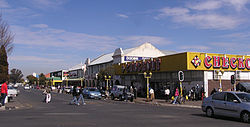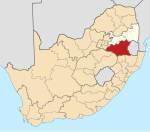|
Standerton
Standerton is a large commercial and agricultural town lying on the banks of the Vaal River in Mpumalanga, South Africa, which specialises in cattle, dairy, maize and poultry farming. The town was established in 1876 and named after Boer leader Commandant A. H. Stander. During the First Boer War a British garrison in the town was besieged by the Boers for three months. General Jan Smuts won this seat during elections and went on to assist in setting up the League of Nations. Standerton is the seat of the Lekwa Local Municipality.[2] HistoryStanderton was founded in 1878 on a farm called Grootverlangen and named after its owner Commandant Adriaan Henrik Stander.[3] The South African Republic's Volksraad approved the formation of a town at the drift in 1876 and proclaimed two years later.[4]: 301 It was granted municipal status in 1903.[3] The crossing over the Vaal River, now bridged, was known as Stander's Drift and a hill close to the town was called Standerskop were also named after Stander.[3][5]: 303 During the First Boer War (1880–81), a British unit was besieged by the Boer forces who shelled them from the nearby hill, the former holding out until the end of the war in February 1881.[4]: 301 Great Trek memorial controversyThe town has received nationwide media attention in 2007 and 2008 following the destruction of an important voortrekker memorial. This monument, located near the facade of the municipality building, was constructed by Afrikaners to mark the 150th anniversary of the Great Trek. The Lekwa municipality's mayor Queen Radebe-Khumalo ordered the structure demolished in April 2007. "That piece of thing means nothing to us. It's just a piece of cement with tracks. I do not even know where it comes from", Radebe-Khumalo declared in a statement quoted by the Beeld newspaper.[6] The incident led to widespread condemnation by the local Afrikaans community. Jan Bosman, a spokesperson for the Afrikanerbond, claimed that "actions like these undo the spirit of reconciliation as promoted by former president Nelson Mandela and Archbishop Desmond Tutu".[7] In June 2007, a joint initiative between AfriForum and Solidarity lodged an application to the Pretoria High Court requesting that the mayor offer compensation for damages claimed. A subsequent court order ruled that Radebe-Khumalo and her municipality would pay for the damage and prohibited attempts to remove another statue erected in memory of Anglo-Boer war concentration camp victims.[8]  In May 2010, the memorial was rebuilt on its original site.[9][10] Sakhile Township riotsThe township of Sakhile near Standerton was the site of violent, service delivery riots that led to the Lekwa Municipality mayor Juliet Queen Radebe-Khumalo and other senior municipal officials, being recalled by the African National Congress in October 2009. The riots included the burning of tyres and blocking some entries to the town.[11] EconomyAgricultureThe area around the town promotes mixed agriculture with crops such as maize, sunflower seeds, ground nuts and potatoes. Poultry and dairy farming is also conducted in the region.[4]: 301 ManufacturingStanderton MillsStanderton Mills Pty Ltd was established in 1947. Mainly manufacturing and supplying yarn and woven industrial fabrics.[12] EducationInfrastructureDamsGrootdraai Dam is situated in the upper reaches of the Vaal River less than 10 km upstream of Standerton. It has a catchment area of 8,195 km2, a mean annual precipitation of approximately 750 mm, a mean annual potential evaporation at the dam site of 1,400 mm and a natural inflow of 580 million m3/a. The full supply capacity of the reservoir is 364 million m3. The Grootdraai dam was completed in 1982. Notable peopleAlthough Standerton is a rural town surviving mainly on agriculture, it has produced talented people prominent in South African society.
References
External links |
||||||||||||||||||||||||||||||||||||||||||||||||||||||||||||||



